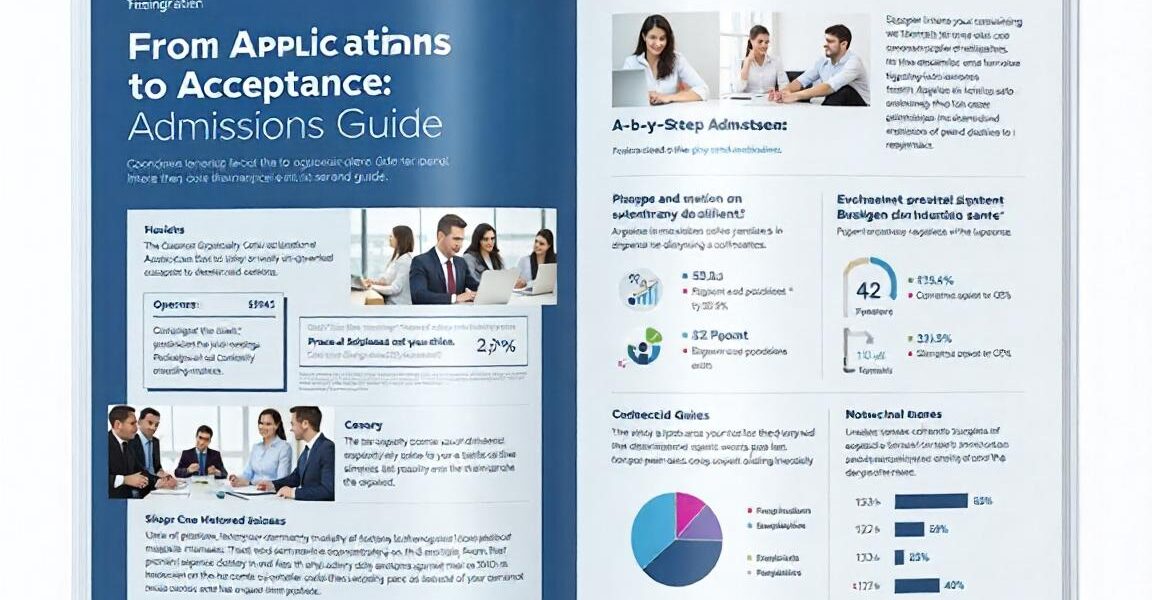The college or university admissions help process can be overwhelming, especially for first-time applicants. With multiple steps, deadlines, and requirements, staying organized is key to a successful application. This step-by-step guide will walk you through the journey—from researching schools to receiving your acceptance letter—ensuring you stay on track and present your best self to admissions committees.
Step 1: Research and Shortlist Schools
Before applying, identify institutions that align with your academic, financial, and personal preferences. Consider:
-
Academic Programs: Does the school offer your desired major?
-
Location: Do you prefer urban, suburban, or rural campuses?
-
Cost & Financial Aid: What is the tuition, and what scholarships are available?
-
Campus Culture: Are there clubs, sports, or extracurriculars that interest you?
Create a balanced list of reach, match, and safety schools to maximize your chances of acceptance.
Step 2: Understand Admission Requirements
Each school has different requirements. Common application materials include:
-
High School Transcripts (GPA matters)
-
Standardized Test Scores (SAT/ACT—check if test-optional)
-
Letters of Recommendation (Usually from teachers or counselors)
-
Personal Essay or Statement of Purpose
-
Extracurricular Activities & Resume
-
Portfolio or Audition (For arts/performing arts programs)
Check each school’s website for specific deadlines (Early Decision, Early Action, Regular Decision, or Rolling Admissions).
Step 3: Prepare for Standardized Tests (If Required)
If your target schools require SAT or ACT scores:
-
Register early (deadlines are usually weeks before the test date).
-
Take practice tests and consider prep courses if needed.
-
Some schools superscore (take the best section scores across multiple tests).
If applying test-optional, decide whether submitting scores strengthens your application.
Step 4: Request Letters of Recommendation
Ask teachers, counselors, or mentors who know you well. Provide them with:
-
Your resume or a summary of your achievements.
-
The deadline and submission instructions.
-
A thank-you note afterward!
Give recommenders at least 4-6 weeks’ notice.
Step 5: Write a Standout Personal Essay
Your essay is your chance to showcase your personality and experiences. Tips:
-
Choose a meaningful topic (avoid clichés).
-
Show, don’t just tell—use anecdotes.
-
Be authentic and reflective.
-
Proofread multiple times (or get feedback).
Some schools require supplemental essays—answer them thoughtfully.
Step 6: Complete and Submit Your Application
Most U.S. colleges accept applications via:
-
The Common App (used by 1,000+ schools)
-
Coalition App (another multi-school platform)
-
School-Specific Portals (e.g., UC Application for University of California)
Double-check for:
-
Correct spelling and grammar.
-
Accurate personal and academic details.
-
Submission before the deadline (early submissions avoid last-minute stress).
Step 7: Apply for Financial Aid & Scholarships
To secure funding:
-
Complete the FAFSA (for U.S. federal aid; opens October 1).
-
Submit the CSS Profile (if required by private schools).
-
Search for scholarships (through schools, private organizations, or local programs).
Deadlines vary, so apply as early as possible.
Step 8: Track Your Application Status
After submitting, check your application portal to ensure all materials (transcripts, test scores, recommendations) are received. Follow up if anything is missing.
Step 9: Prepare for Interviews (If Required)
Some schools (especially competitive ones) may require interviews. Tips:
-
Research common questions and practice answers.
-
Dress professionally and be punctual.
-
Prepare thoughtful questions about the school.
Step 10: Await Decisions & Compare Offers
Admission decisions typically arrive by:
-
December-January for Early Action/Early Decision.
-
March-April for Regular Decision.
Once you receive acceptances, compare:
-
Financial aid packages.
-
Academic fit.
-
Campus life opportunities.
Step 11: Accept an Offer & Prepare for Enrollment
After choosing a school:
-
Submit your enrollment deposit by the deadline.
-
Complete housing applications (if applicable).
-
Attend orientation and register for classes.
Final Thoughts
The admissions process requires planning, effort, and patience. By following these steps, you’ll maximize your chances of acceptance and find the best-fit institution for your future. Stay organized, seek guidance when needed, and put your best foot forward—your hard work will pay off!




